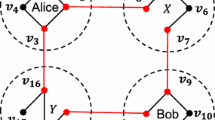Abstract
Distributed constraint satisfaction problems (DisCSPs) are composed of agents connected by constraints. The standard model for DisCSP search algorithms uses messages containing assignments of agents. It assumes that constraints are checked by one of the two agents involved in a binary constraint, hence the constraint is fully known to both agents. This paper presents a new DisCSP model in which constraints are kept private and are only partially known to agents. In addition, value assignments can also be kept private to agents and not be circulated in messages. Two versions of a new asynchronous backtracking algorithm that work with partially known constraints (PKC) are presented. One is a two-phase asynchronous backtracking algorithm and the other uses only a single phase. Another new algorithm preserves the privacy of assignments by performing distributed forward-checking (DisFC). We propose to use entropy as quantitative measure for privacy. An extensive experimental evaluation demonstrates a trade-off between preserving privacy and the efficiency of search, among the different algorithms.
Similar content being viewed by others
References
Bessiere, C., Brito, I., Maestre, A., Meseguer, P. (2005). Asynchronous backtracking without adding links: a new member in the abt family. Artificial Intelligence, 161(1–2), 7–24.
Brito, I., & Meseguer, P. (2003). Distributed forward checking. Proc. of 8th CP, 2833, 801–806.
Brito, I., & Meseguer, P. (2005). Distributed stable matching problems. Proc. of the 10th CP, Lecture Notes in Computer Science, 3709, 152–166.
Chandy, K., & Lamport, L. (1985). Distributed snapshots: Determining global states of distributed systems. ACM Trans. Computer Systems, 3(2), 63–75.
Cover, T. M., & Thomas, J. A. (2006). Elements of information theory. Wiley (2nd ed).
Gent, I. P., & Walsh, T. (1999). CSPlib: A benchmark library for constraints. Technical report APES-09-1999. Available from http://csplib.cs.strath.ac.uk/. A shorter version appears in the Proc. of the 5th CP (CP-1999) (pp. 480–481).
Greenstadt, R. (2007). Improving privacy in distributed constraint optimization. Harvard Ph.D. thesis. Available from http://www.eecs.harvard.edu/~greenie/hthesis.pdf.
Haralick, R., & Elliot, G. (1980). Increasing tree search efficiency for constraint satisfaction problems. Artificial Intelligence, 14, 263–313.
Lamport, L. (1978). Time, clocks, and the ordering of events in distributed system. Communication of the ACM, 2, 95–114.
Lynch, N. A. (1997). Distributed algorithms. Morgan Kaufmann.
Maheswaran, R. T., Pearce, J. P., Bowring, E., Varakantham, P., Tambe, M. (2006). Privacy loss in distributed constraint reasoning: A quantative framework for analysis and its applications. Autonomous Agents and Multi Agent Systems, 13, 27–60.
Meisels, A., & Lavee, O. (2004). Using additional information in DisCSP search. In Proc. 5th workshop on distributed constraints reasoning, DCR-04.
Meisels, A., Razgon, I., Kaplansky, E., Zivan, R. (2002). Comparing performance of distributed constraints processing algorithms. In Proc. 3th workshop on distributed constraints reasoning, DCR-02 (AAMAS-2002) (pp. 86–93).
Modi, P. J., & Veloso, M (2004). Multiagent meeting scheduling with rescheduling. In Proc. of the fifth workshop on distributed constraint reasoning, DCR, CP 2004.
Nissim, K., & Zivan, R. (2005). Secure DisCSP protocols—From centralized towards distributed solutions. In Proc. 6th workshop on distributed constraints reasoning, DCR-05.
Prosser, P. (1996). An empirical study of phase transitions in binary constraint satisfaction problems. Artificial Intelligence, 81, 81–109.
Shanon, C. E. (1963). The mathematical theory of communication. University of Illinois Press.
Silaghi, M. C., & Mitra, D. (2004). Distributed constraint satisfaction and optimization with privacy enforcement. In Proc. 3rd IC on intelligence agent technology (pp. 531–535).
Silaghi, M. C., Sam-Haroud, D., Faltings, B. (2000). Asynchronous search with aggregations. In Proc. of the 17th. AAAI (pp. 917–922).
Smith, B. M. (1996). Locating the phase transition in binary constraint satisfaction problems. Artificial Intelligence, 81, 155–181.
Solotorevsky, G., Gudes, E., Meisels, A. (1996). Modeling and solving distributed constraint satisfaction problems (DCSPs). In Constraint Processing, 96, 561–562.
Wallace, R. J., & Freuder, E. (2002). Constraint-based multi-agent meeting scheduling: Effects of agent heterogeneity on performance and privacy loss. In Proc. 3rd workshop on distributed constrait reasoning, DCR-02 (pp. 176–182).
Yokoo, M., & Hirayama, K. (2000). Algorithms for distributed constraint satisfaction: A review. Autonomous Agents and Multi-Agent Systems, 3(2), 185–207.
Yokoo, M., Durfee, E., Ishida, T., Kuwabara, K. (1992). Distributed constraint satisfaction for formalizing distributed problem solving. In Proc. of the 12th. DCS.
Yokoo, M., Durfee, E., Ishida, T., Kuwabara, K. (1998). The distributed constraint satisfaction problem: Formalization and algorithms. IEEE Trans. Knowledge and Data Engineering, 10, 673–685.
Yokoo, M., Suzuki, K., Hirayama, K. (2005). Secure distributed constraint satisfaction: Reaching agreement without revealing private information. Artificial Intelligence, 161(1–2), 229–246.
Zivan, R., & Meisels, A. (2006). Dynamic ordering for asynchronous backtracking on discsps. Constraints, 11(2, 3), 179–197.
Zivan, R., & Meisels, A. (2006). Message delay and discsp search algorithms. Annals of Mathematics and Artificial Intelligence (AMAI), 46, 415–439, October.
Author information
Authors and Affiliations
Corresponding author
Additional information
Partially supported by the Spanish project TIN2006-15387-C03-01. Partially supported by the Lynn and William Frankel center for Computer Sciences and the Paul Ivanier Center for Robotics and Production Management.
Rights and permissions
About this article
Cite this article
Brito, I., Meisels, A., Meseguer, P. et al. Distributed constraint satisfaction with partially known constraints. Constraints 14, 199–234 (2009). https://doi.org/10.1007/s10601-008-9048-x
Received:
Accepted:
Published:
Issue Date:
DOI: https://doi.org/10.1007/s10601-008-9048-x




